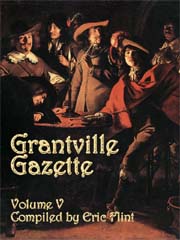
Well—hallelujah—we managed to get Volume 5 of the Gazette out pretty much on schedule, about four months after the publication of Volume 4. As I said in my preface to that issue, I'm hoping to be able to maintain a triannual publication schedule for the magazine. We should be able to do the same, I think, with Volumes 6 and 7. We've already got all the stories and articles assembled for Vol. 6, and most of the ones we'll need for Vol. 7.
That said, most of the time involved in producing such a magazine is required by the editing and copy-editing process, which takes some time. Still, we should be able to get volume 6 out before the end of the year.
Some remarks on the contents of this volume:
As always, parsing the distinction between "regular stories" and "continuing serials" probably falls somewhere in the category of secularized medieval scholasticism. Just to name one example, Karen Bergstralh's "Of Masters and Men" is essentially a sequel to her "One Man's Junk," published in the last volume. But since there is—yet, anyway—no indication that she's going to be continuing this story, I chose not to put it in the category of continuing sequels.
Yes, you can argue the point. The fact remains that I'm the editor of the magazine and if say the number of angels who can dance on the head of a pin is 15,468,622, then—here, at least—15,468,622 it is.
Ultimately, this is probably a hopeless battle on my part for Literary Clarity. Hopeless, because as time goes on, it's becoming clearer and clearer to me that the assessment I made of the Grantville Gazette in my preface to Volume 4 is indeed correct. The Gazette is, indubitably, that most lowly and despised of all literary sub-genres.
To wit, a soap opera.
Look, let's face it. In the 1632 novels, you get—more or less—The Big Picture featuring the Stars of the Story. In the 1632 anthologies, you get basically more of the same, simply with a narrower and tighter focus and (often but not always) featuring a worthy character actor who gets his or her day to strut on the stage.
What do you get in the Gazette? All the shenanigans of everybody else, that's what. The damn spear-carriers, run amok. Slice of life story piled onto family sagas—functional and dysfunctional alike—and all of it ladled over with a heavy scoop of personal melodrama.
I mean, honestly.
Who cares—just to name one example—if Karen Bergstralh's woebegone blacksmith gets around the oppression of the guild-masters and starts setting up his own successful business? Who cares—to name another example—if the pimply-faced American teenager in Jay Robinson's "Breaking News" wins the heart of the (hopefully not acne-ridden) teenage daughter of a downtime artist who is only remember by art connoisseurs?
(The mother, not the daughter—nobody except scholars remembers the daughter, for Pete's sake, until Jay dragged her out of historical obscurity.)
Shall I go on? Who cares if Velma Hardesty's daughters escape from the Horrible Mother's clutches, in Goodlett and Huff's "Susan Story"? Just to make it worse, from what I can tell about a dozen other writers seem to have become infatuated with Wicked Velma, and it looks like we'll be getting a small cottage industry cropping up of "Velma Gets Her Just Desserts" stories.
Sigh. Not one of these stories deals with Ye Big Picture. Not one of them fails to wallow in the petty details of Joe or Dieter or Helen or Ursula's angst-ridden existence.
Pure, unalloyed, soap opera, what it is.
Fortunately, before I start tearing my hair out over the Lit'rary Disgrace involved, my commercial instincts rally to the rescue. Because, while it is indeed true that soap opera gets no respect from the Illuminati, it's...
Well.
Wildly popular.
So, I brace myself. No, more. I find a peculiar sort of glee in contemplating the fact that a universe I originally created in order to explore some of the alternate possibilities for The Big Issues—democracy, religious tolerance, that stuff—has expanded to include a veritable spaghetti bowl of personal stories that have absolutely no function or purpose than to examine the multitude of ways in which the unwashed masses get about their lives under the changing circumstances.
It's a fitting full circle, I think. Let us not forget that, in the end, democracy is just a form of government—and the only purpose of government (legitimate one, anyway) is to enable the unwashed masses to get about their lives with a minimum of grief and anxiety. That way they can invent, discover, explore and wallow in their own hassles, instead of being saddled with somebody else's.
So, again, we venture into the 1632 soap opera. Hankies can be found on the coffee table, I believe. Yes, I know the guys won't need them. Shirt-sleeves will always do, in a pinch.
Eric Flint
August, 2005